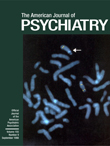Olanzapine Augmentation of Fluoxetine in the Treatment of Trichotillomania
To the Editor: The selective serotonin reuptake inhibitor (SSRI) fluoxetine has been reported to alleviate symptoms of trichotillomania, although controlled studies have failed to demonstrate its efficacy (1). Data exist supporting a role for neuroleptic addition for some SSRI-refractory cases of trichotillomania (2). Given more benign adverse effect profiles of “atypical” neuroleptics, the use of risperidone has been investigated for SSRI-refractory trichotillomania (3). Here we report improvement in trichotillomania following addition of olanzapine to continuing administration of fluoxetine.
Ms. A, a 22-year-old woman with trichotillomania and obsessive-compulsive disorder, had been treated in our clinic for 3 years. She had received adequate trials of clomipramine, sertraline, sertraline with lithium, fluvoxamine, fluvoxamine with desipramine, fluvoxamine with risperidone, fluvoxamine with perphenazine, and fluoxetine. Of these, sertraline, fluvoxamine, and fluoxetine monotherapies effectively reduced depressive and obsessive-compulsive symptoms. Ms. A continued to engage in hair pulling so severe that at times, eyebrows and eyelashes were totally removed and large bald spots appeared on her scalp. The only trial associated with significant decrease in hair pulling was risperidone, 1 mg/day, and augmentation of fluvoxamine, 300 mg/day. However, Ms. A developed hyperprolactinemia (prolactin level=97.7 ng/ml; upper limit of normal=29.2 ng/ml) and intolerable galactorrhea, which resolved upon risperidone discontinuation.
Ms. A continued to have interfering symptoms of trichotillomania following a 15-week trial of fluoxetine, 40 mg/day. Given risperidone"s apparent effectiveness in combination with an SSRI in targeting symptoms of trichotillomania in this individual and olanzapine"s lower propensity to alter prolactin secretion, an open-label trial of olanzapine augmentation was performed. Olanzapine was initiated at 5 mg/day and increased to 10 mg/day after a partial response was observed at 5 weeks. At 7 weeks, Ms. A’s score on the Massachusetts General Hospital Hairpulling Scale had decreased from 23 at onset of the olanzapine trial to 6; her score on the Psychiatric Institute Trichotillomania Scale, from 22 to 12; and her score on the Yale-Brown Obsessive Compulsive Scale compulsion subscale, from 13 to 4. Clinically, these ratings correlated with significant eyebrow, eyelash, and scalp hair regrowth. At 9 weeks, she reported sedation, and her olanzapine dose was reduced to 2.5 mg/day over 8 weeks. She maintained a therapeutic response for 22 weeks, with full regrowth of eyebrows, eyelashes, and scalp hair and further decreases in ratings scores. She denied symptoms of galactorrhea and reported an undesired weight gain of 8 pounds.
Ms. A’s case suggests a role for olanzapine in the treatment of individuals with SSRI-refractory trichotillomania. Because each atypical neuroleptic has a unique pharmacological profile, it will be important to gather clinical experience with each agent to determine individual efficacy in targeting specific symptoms, as well as tolerability in distinct patient populations (3). Larger, placebo-controlled, double-blind studies are necessary to define better a role for olanzapine in the treatment of SSRI-refractory trichotillomania.
1. Christenson GA, MacKenzie TB, Mitchell JE, Callies AL: A placebo-controlled, double-blind crossover study of fluoxetine in trichotillomania. Am J Psychiatry 1991; 148:1566–1571Link, Google Scholar
2. Stein DJ, Hollander E: Low-dose pimozide augmentation of serotonin reuptake blockers in the treatment of trichotillomania. J Clin Psychiatry 1992; 53:123–126Medline, Google Scholar
3. Potenza MN, McDougle CJ: Potential of atypical antipsychotics in the treatment of non-psychotic disorders. CNS Drugs 1998; 9:213–232Crossref, Google Scholar



